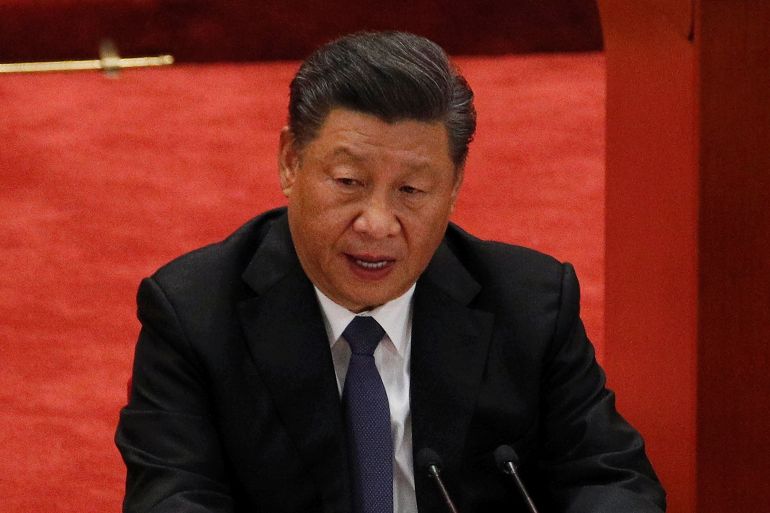China’s Xi urges people in Tibet to ‘follow party’ in rare visit
President Xi’s visit comes as China faces increased security concerns as a result of clashes with India and the withdrawal of US-led troops from Afghanistan.

China’s President Xi Jinping made his first visit to the Tibet Autonomous Region as national leader this week and urged people there to “follow the party”, state news agency Xinhua said on Friday.
Xi’s July 21-22 visit – the first to Tibet by a Chinese leader in 30 years – comes as the country faces increased security concerns as a result of clashes with India and the withdrawal of US-led troops from Afghanistan.
Keep reading
list of 3 itemsFlood toll rises in central China, as tens of thousands evacuated
COVID-19 origins: China rejects WHO proposal to return to Wuhan
The visit also shows the ruling Chinese Communist Party’s confidence in having established order and gained support in the region, analysts say.
Xi flew into the city of Nyingchi on Wednesday and took a train to the Tibetan capital Lhasa the following day along a section of the high-elevation railway being built to link the mountainous border region with Sichuan province.
In footage released Friday by state broadcaster CCTV, Xi was seen greeting a crowd wearing ethnic costumes and waving Chinese flags as he left his plane, in a red carpet welcome as dancers performed around him.
After a “warm welcome by cadres and masses of all ethnic groups”, Xi went to the Nyang River Bridge to learn about ecological and environmental protection of the Yarlung Tsangpo River and the Nyang River, CCTV said.
In Lhasa, Xi visited a monastery and the Potala Palace Square, and “inspected ethnic religion work” and Tibetan cultural heritage protection, according to Xinhua.
The palace is the traditional home of Tibetan Buddhism’s spiritual leader, the Dalai Lama, who is in exile and has been branded a dangerous separatist by Beijing.
State television network CCTV showed a Tibetan woman wiping away tears as she joined a crowd of people dressed in traditional costume clapping enthusiastically to welcome Xi.
Xi instructed local provincial officials to work towards making people in Tibet identify more with the “great motherland, Chinese people, Chinese culture, the Chinese Communist Party and socialism with Chinese characteristics”, according to Xinhua.
He also said that only when the people “follow the party” can the “rejuvenation of the Chinese nation” be realised.
Culture and loyalty
More than 80 percent of the population in Tibet are ethnic Tibetan while Han Chinese are the minority. Most Tibetans are also Buddhists. China’s constitution allows for freedom of religion but the party adheres strictly to atheism.
In Lhasa, Xi watched a cultural performance that showcased Tibetan culture and loyalty to the party through song and dance, including a famous song with the lyric “sing a folk song for the party, the party is like my mother”.
In Nyingchi, Xi also inspected rural rejuvenation and environmental protection.
On China’s border with India, Tibet is seen as having critical strategic importance to Beijing. Last year China and India saw the most serious clash in decades on their disputed border in the Himalayas, with deaths on both sides.
Photos released by Xinhua show Xi was accompanied by Zhang Youxia, a vice chairman of China’s Central Military Commission and a senior general in the People’s Liberation Army.
The Chinese leader has previously visited Tibet twice, once in 1998 as Fujian province’s party chief and another time in 2011 as vice president.
The last Chinese president to visit was Jiang Zemin in 1990.
Beijing sent troops into Tibet in 1950 in what it officially terms a peaceful liberation and maintains a heavy security presence in the region, which has been prone to unrest.
A violent clash in 2008 between Chinese police and Tibetan monks commemorating an anniversary of the 14th Dalai Lama’s exit from Tibet left local authorities unsure for many years if a visiting Chinese leader would be welcomed or safe, said Yang Chaohui, professor of politics at Peking University.
Tibet’s high altitude, which can take a toll on leaders not accustomed to the climate, is another reason why China’s top leaders rarely visit, he said.